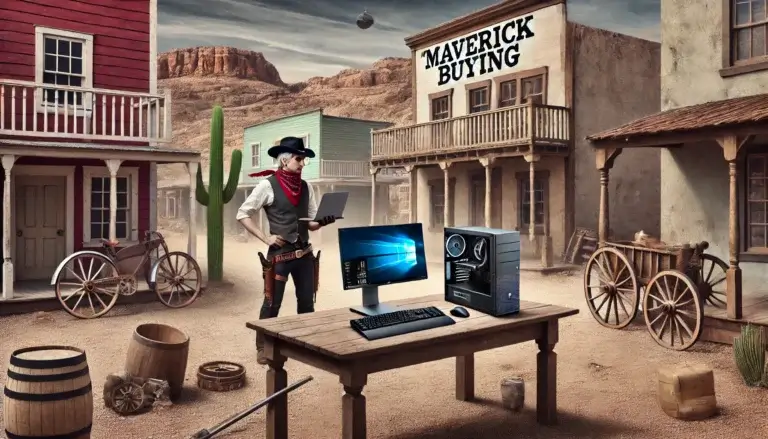That moment when it turns out that a supposed shortcut was not a good idea at all... sound familiar? The situation is similar with maverick buying, i.e. unauthorized procurement that bypasses standard purchasing processes. There are many reasons why this happens and solutions to counteract it.
Maverick buying sounds exciting at first - it conjures up images of lone cowboys, wild and free, obeying only the laws of the prairie. After all, the term goes back to the Texan cattle rancher Samuel A. Maverick who, unlike other breeders, did not brand his cattle. However, the purchasing process is anything but the Wild West, as it is a complex network of negotiations, agreements, safety measures, risk management and budget restrictions. This network was built up by experts with a great deal of effort and dedication over a long period of time and according to economic criteria.
Nevertheless, employees or departments ignore these barriers. This happens in two ways.
- Bypassing the purchase: The employee selects the supplier themselves and negotiates the conditions. The entire purchasing process takes place without the involvement of the purchasing department, which only finds out about it when the finance department makes an inquiry (there is no order in the system).
- Circumvention of the framework agreement: Although the purchasing department is involved in the selection of the supplier, the conditions of the existing contract are not used. For example, alternatives to the negotiated parts are purchased or the negotiated prices are not taken into account.
Why does Maverick Buying happen?
- Naive Maverick Buying: An employee does not know the procurement process of his company and therefore acts on his own authority.
- Impulsive Maverick Buying: An employee is aware that he is ignoring the protocol, but believes that his company will not be harmed.
- Calculated Maverick Buying: An employee or department deliberately decides to bypass the official procurement channels, even though this could harm the company.
- Panic Maverick Buying: There is an urgent reason to bypass the established procurement process, for example to quickly procure products or services that are not yet well represented in the procurement process.
What impact does Maverick Buying have on a company?
Many companies tacitly tolerate these four ways of circumventing the procurement process. According to a study by the University of Leipzig, maverick buying affects over 25 % of purchases in many organizations. This means that:
- One of four invoices of a company does not go through the central purchasing office and no corresponding Ordering in the ERP system of the company.
It is obvious that this buying behavior has a negative impact on the company, regardless of the intentions behind it. In an article on maverick buying and its significance for purchasing, Peter Pruetting mentions some of these consequences, which we have added to the list below:
- Cost increase: Additional work is required for accounting, purchasing and incoming goods inspection.
- Contract negotiations: The purchasing department cannot take these goods into account when negotiating contracts with suppliers.
- True demand cannot be mapped: The central purchasing department cannot estimate the actual demand for an item.
- Quality problems: Problems could arise if there are quality issues with these items as they have not been professionally negotiated and contractually agreed.
- Risk management: The central purchasing department's risk management is not effective.
- Administrative costs: A large number of suppliers increases both the administrative effort and the costs.
- Cost overview: It is becoming more difficult to keep track of costs.
The significantly negative influence of maverick buying on a company's pricing should not be forgotten. A good buyer is also a good negotiator. The terms in framework agreements with suppliers are usually rigorously negotiated and based on clearly defined purchase quantities. The difference between a negotiated and a non-negotiated price can be significant, which can make maverick buying very expensive for a company.
How can you prevent maverick buying?
To prevent orders from bypassing the purchasing department, you need clear, binding rules and an IT-supported procurement process. For these to be successful, your Purchasing processes first be made transparent and easy to understand.
In our experience, companies have successfully combated maverick buying with the following measures:
- Communicate processes and responsibilities clearly: Communicate the procurement process in your company to all employees via various communication channels such as presentations when introducing new employees, clear instructions on your intranet and updates or reminders by email.
- Clearly communicate the consequences of maverick buying: It is not enough to explain the process clearly. Employees need to understand the impact of unauthorized purchases on the company. The personal consequences for breaching the rules should also be made clear - up to and including a warning and immediate dismissal.
- Simple, automated procurement system: The best way to stop maverick buying is to make the procurement process as simple as possible. This is where digitalization can help by reducing the workload and complexity for all parties. A digital transformation of your purchase-to-pay process includes the digitalization of the following phases:
- Orders
- Orders
- Incoming goods
- Invoicing
Consult-SK can help you automate your processes with workflow management and approval solutions, combined with our successful purchase-to-pay solution.
Advantages of the complete digitalization of your procurement process:
- Faster Procurement: Faster processing from purchase to payment.
- Compliance with the process: Ensure that employees adhere to the process and only act within their areas of responsibility.
- Better cost control: Better overview of orders and expenses.
- Fewer errors: Fewer errors due to less or no manual intervention in the process.






